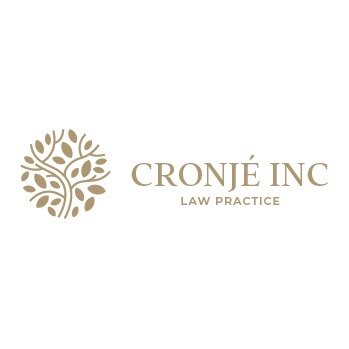Best Water Law Lawyers in Namibia
Share your needs with us, get contacted by law firms.
Free. Takes 2 min.
Or refine your search by selecting a city:
List of the best lawyers in Namibia
About Water Law in Namibia
Water law in Namibia governs how water resources are managed, used, and protected across the country. Given the arid climate and limited natural water sources in Namibia, these regulations play a vital role in balancing the needs of domestic, agricultural, industrial, and environmental sectors. The legal framework is designed to ensure equitable access to water, promote sustainable usage, and safeguard water sources from pollution and over-exploitation. Namibia's approach combines statutory laws, customary practices, and policies to manage surface water, groundwater, and shared watercourses efficiently and fairly.
Why You May Need a Lawyer
There are several situations in which a person or business might require legal assistance regarding water in Namibia. Common reasons include navigating complex licensing procedures for water use or abstraction, resolving water rights disputes with neighbors or communities, dealing with the impact of water infrastructure projects (such as dams or pipelines), and addressing issues related to water pollution or contamination. A lawyer can also help interpret and comply with the Water Resources Management Act and local bylaws, represent clients in negotiations or disputes, and provide advice for those facing regulatory enforcement or penalties. Legal guidance ensures that your activities align with the prevailing water laws and that your rights and responsibilities are clear.
Local Laws Overview
Namibia's central water law is the Water Resources Management Act, 2013, which replaced the older Water Act of 1956. This legislation establishes the overall framework for the allocation, management, protection, and development of water resources. Key aspects of Namibian water law include:
- Requirement for individuals and entities to obtain permits for the use, abstraction, or diversion of water from both surface and groundwater sources.
- Establishment of the Department of Water Affairs and regional Water Basin Management Committees to oversee water governance.
- Promotion of integrated water resources management to balance social, economic, and environmental needs.
- Regulation of wastewater discharge and the management of water pollution.
- Procedures for the resolution of disputes regarding water use and access, including appeals processes.
- Special rules and considerations for transboundary watercourses shared with Namibia's neighbors.
Other relevant laws and regulations may include environmental protection laws, local council or traditional authority regulations, and international agreements on shared rivers.
Frequently Asked Questions
What is the main law governing water in Namibia?
The Water Resources Management Act, 2013, is the principal legislation governing water management and use in Namibia.
Do I need a permit to use water from a river or borehole?
Yes, most uses of water from natural sources, such as rivers or boreholes, require a permit from the Ministry of Agriculture, Water and Land Reform.
Can traditional or customary water rights still apply?
Customary water rights, especially in rural areas, can be recognized, but they must not conflict with national water laws or the requirements for permits.
Who resolves disputes about water use between neighbors?
Disputes can be addressed through local Water Point Committees, Water Basin Management Committees, or the courts if necessary.
Is groundwater extraction regulated separately from surface water?
Yes, both forms of water use are regulated, and permits are needed for groundwater extraction just as for surface water use.
What are the penalties for illegal water use or pollution?
Penalties can include fines, imprisonment, and orders to remedy environmental damage depending on the severity of the offense.
How are water rights allocated during drought?
During periods of scarcity, authorities may prioritize essential uses (such as drinking water) and restrict other activities to protect public health and the environment.
What role do community water committees play?
Community Water Committees help manage local water sources, resolve usage issues, and work with government bodies to implement water policies.
Are there special requirements for agricultural or industrial water use?
Yes, larger-scale or high-impact uses typically require detailed applications, environmental assessments, and ongoing compliance monitoring.
What should I do if my water rights are being infringed?
You should first seek to resolve the issue locally if possible, but you may also consult a lawyer to explore mediation or formal legal proceedings if necessary.
Additional Resources
If you need further information or support, the following resources and organizations may be helpful:
- Ministry of Agriculture, Water and Land Reform - Water Affairs Department
- Namibia Water Corporation Limited (NamWater)
- Namibia Law Reform and Development Commission
- Namibia Environmental and Wildlife Society
- Regional and local Water Basin Management Committees
- University of Namibia - Faculty of Law
These organizations can provide guidance, legal texts, contact points, and sometimes legal clinics or workshops related to water law and management.
Next Steps
If you need legal assistance in the area of water law in Namibia, consider taking the following steps:
- Identify and document your specific issue or concern with as much detail as possible.
- Gather any relevant documents, such as permits, notices, or correspondence with authorities or neighbors.
- Reach out to a qualified lawyer or law firm with experience in Namibian water law.
- Contact your local Water Basin Management Committee for guidance on community-level issues.
- If applicable, consult the Ministry of Agriculture, Water and Land Reform for official guidance or clarifications.
- Stay informed about your rights and responsibilities under the Water Resources Management Act and related policies.
Legal matters about water can be complex, especially when multiple interests or communities are involved. Seeking professional advice early can help resolve issues efficiently and protect your rights regarding Namibia's precious water resources.
Lawzana helps you find the best lawyers and law firms in Namibia through a curated and pre-screened list of qualified legal professionals. Our platform offers rankings and detailed profiles of attorneys and law firms, allowing you to compare based on practice areas, including Water Law, experience, and client feedback.
Each profile includes a description of the firm's areas of practice, client reviews, team members and partners, year of establishment, spoken languages, office locations, contact information, social media presence, and any published articles or resources. Most firms on our platform speak English and are experienced in both local and international legal matters.
Get a quote from top-rated law firms in Namibia — quickly, securely, and without unnecessary hassle.
Disclaimer:
The information provided on this page is for general informational purposes only and does not constitute legal advice. While we strive to ensure the accuracy and relevance of the content, legal information may change over time, and interpretations of the law can vary. You should always consult with a qualified legal professional for advice specific to your situation.
We disclaim all liability for actions taken or not taken based on the content of this page. If you believe any information is incorrect or outdated, please contact us, and we will review and update it where appropriate.
Browse water law law firms by city in Namibia
Refine your search by selecting a city.















